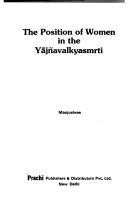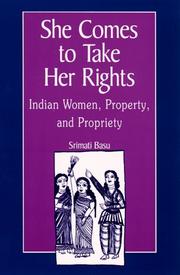| Listing 1 - 3 of 3 |
Sort by
|

ISBN: 8185227012 Year: 1997 Publisher: New Delhi : Prachi Publishers & Distributors,
Abstract | Keywords | Export | Availability | Bookmark
 Loading...
Loading...Choose an application
- Reference Manager
- EndNote
- RefWorks (Direct export to RefWorks)
Book
ISBN: 0197664571 0197664555 0197664563 0197664547 Year: 2023 Publisher: New York, New York : Oxford University Press,
Abstract | Keywords | Export | Availability | Bookmark
 Loading...
Loading...Choose an application
- Reference Manager
- EndNote
- RefWorks (Direct export to RefWorks)
"This chapter deals with two conceptually distinct, yet related legal issues concerning widows. The first of these is widow remarriage; the second is niyoga, which is the Sanskrit term for the specific version of levirate practiced in classical India. The reason that these two issues jointly comprise the focus of a single chapter of this book is that, despite the effort of the Hindu legal tradition to dissociate them, they are closely related. The reason that these two issues comprise the focus of the first chapter is that niyoga in particular is the first widow-related issue to become the subject of debate within Dharmaâs¯astra and, thus, the first such issue where one can see a major shift in Brahmanical opinion over time, specifically a shift from general acceptance to universal rejection. By contrast, the Dharmaâs¯astra tradition widely opposed the practice of widow remarriage from its inception and support for widow remarriage always constituted a minority position"--
Widows (Hindu law) --- Widows --- Hindu law --- Legal status, laws, etc. (Hindu law)

ISBN: 0585075727 9780585075723 0791440958 0791440966 0791495922 Year: 1999
Abstract | Keywords | Export | Availability | Bookmark
 Loading...
Loading...Choose an application
- Reference Manager
- EndNote
- RefWorks (Direct export to RefWorks)
Using the contemporary workings of property law in India through the lives and thoughts of middle-class and poor women, this is a study of the ways in which cultural practices, and particularly notions of gender ideology, guide the workings of law. It urges a close reading of decisions by women that appear to be contrary to material interests and that reinforce patriarchal ideologies.Hailed as a radical moment for gender equality, the Hindu Succession Act was passed in India in 1956 theoretically giving Hindu women the right to equal inheritance of their parents' self-acquired property. However, in the years since the act's existence, its provisions have scarcely been utilized. Using interview data drawn from middle-class and poor neighborhoods in Delhi, this book explores the complexity of women's decisions with regard to family property in this context. The book shows that it is not passivity, ignorance of the law, naivet about wealth, or unthinking adherence to gender prescriptions that guides women's decisions, but rather an intricate negotiation of kinship and an optimization of socioeconomic and emotional needs. An examination of recent legal cases also reveals that the formal legal realm can be hospitable to women's rights-based claims, but judgments are still coded in terms of customary provisions despite legal criteria to the contrary.
Property (Hindu law). --- Sex role --- Women (Hindu law). --- Women --- Women's rights --- Economic conditions. --- Social conditions. --- Women (Hindu law) --- Property (Hindu law) --- Hindu law --- Legal status, laws, etc. (Hindu law) --- Women's Rights --- Law --- Political Science --- Social Science --- Religion --- Social science
| Listing 1 - 3 of 3 |
Sort by
|

 Search
Search Feedback
Feedback About UniCat
About UniCat  Help
Help News
News